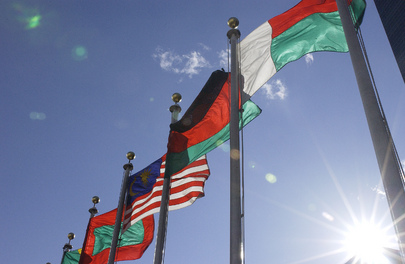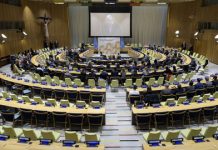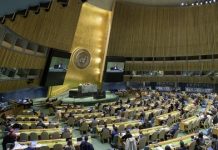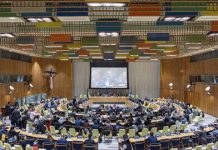Assistant Secretary-General Miroslav Jenča, whose portfolio straddles both Political and Peacebuilding Affairs, voiced concern over attacks on energy infrastructure as winter approaches.
Drones, death and devastation
Mr. Jenča said at least 208 Ukrainian civilians were killed and 1,220 injured in September, making it the month with the highest number of civilian casualties this year.
Overall, 11,973 civilians have been killed, including 622 children, since the start of the full-scale Russian invasion in February 2022, according to the UN human rights office, OHCHR. During this time, 25,943 people have been injured, including 1,686 children.
Civilian casualties and damage to civilian infrastructure are reported daily in Ukraine, with the Donetsk, Kharkiv, Kherson, Mykolaiv and Sumy regions bearing the brunt, he said.
The latest attacks took place that morning and over the weekend, resulting in several casualties in Zaporizhzhia and Kryviy Rih. Ongoing hostilities have also led authorities in the Kharkiv region to further expand mandatory evacuations to some 7,000 people.
While the worst impact of the war continues to be felt in frontline communities in eastern and southern Ukraine, “death and destruction is also a daily occurrence away from the areas of active fighting,” he said.
This includes residential areas of the capital, Kyiv, which was again targeted with drones that same morning and over the weekend.
He noted that Kyiv was reportedly attacked by over 130 drones on 16 October. The western city of Lviv as well as Odesa in the south have also been repeatedly hit, resulting in multiple civilian casualties.
“We are also concerned about the impact of continuing fighting across the Russian-Ukrainian border, particularly in the Kursk region of the Russian Federation, following Ukraine’s August incursion,” he said.
Attacks on ports
Russia has also resumed attacks on Ukrainian Black Sea ports in recent weeks. Since 1 September, six vessels as well as grain infrastructure in the ports have been damaged, according to local authorities.
This led to wheat prices increasing more than six per cent between 1 September and 14 October, while prices of risk insurance for Ukrainian exporters have surged, affecting the agricultural sector.
Mr. Jenča reminded ambassadors that the safety and sustainability of agricultural exports passing through the Black Sea remain critical for global food security.
In this regard, the UN continues engagement with Ukraine, Russia and Türkiye, as well as other stakeholders, in support of freedom and safety of navigation through this crucial channel.
Energy infrastructure hit
Continuing, he said that “systematic Russian attacks on Ukraine’s energy infrastructure have become one of the defining, abhorrent hallmarks of this war. “
The large-scale destruction and interruption of power and water supplies throughout the country will likely worsen the living conditions for millions of Ukrainians through a third winter of war.
“Vulnerable groups – including older persons, people with disabilities, and the internally displaced – are likely to be disproportionately affected. Many may soon find themselves trapped in their homes without heating and other essential utilities,” he warned.
Millions in need
These conditions are also expected to magnify the already dire humanitarian situation in Ukraine, where some 7.2 million people received humanitarian aid during the first eight months of this year.
He expressed deep concern over the 1.5 million people who the UN has been unable to properly reach in parts of Donetsk, Kherson, Luhansk and Zaporizhzhia regions, currently occupied by Russia.
“We renew our call for the safe, rapid and unimpeded passage of humanitarian relief to all civilians in need, in accordance with International Humanitarian Law,” he said, before urging donors to step up support for the Humanitarian Needs and Response Plan which is just over half funded.
Concern for POWs
Mr. Jenča noted that widespread and systematic reports of torture of Ukrainian prisoners of war (POWs) remains a grave concern.
In interviews conducted since March by the UN human rights office, OHCHR, 97 per cent of Ukrainian prisoners provided consistent and detailed accounts of torture or ill-treatment during captivity, Sixty-eight per cent reported sexual violence.
Meanwhile, half of the Russian POWs interviewed reported experiencing torture or ill-treatment, primarily during the initial stage of internment.
“We urge the authorities of the Russian Federation, as well as of Ukraine, to end this practice and hold perpetrators accountable,” he said.
Mr. Jenča also pointed to a positive development. Last Friday, the sides each exchanged 95 POWs which the UN welcomed, along with the exchange of hundreds of bodies.
Nuclear threat looms
Turning to other concerns, he noted that the safety and security of Ukraine’s nuclear sites remain in jeopardy as long as the war continues, and the situation at the Zaporizhzhia Nuclear Power Plant is particularly precarious.
“Reported regular explosions, drone attacks, gunfire, and repeated interruptions of external power supply increase the risk of a nuclear accident,” he said.
He added that the International Atomic Energy Agency (IAEA) has also been monitoring the impact of reported military activities in the vicinity of the Kursk Nuclear Power Plant in Russia.
“Preventing a nuclear accident during the war is vital. Attacking a nuclear power plant is unimaginable and unacceptable,” he said. “We continue to appeal for maximum restraint by all involved.”
Women, peace and security
Mr. Jenča looked ahead to the Council’s Open Debate on women, peace and security to be held later this week. He urged the full and equal participation of Ukrainian women in all efforts towards a better future for their country.
Moreover, next month will mark 1,000 days of “this devastating war… that continues to cause deep human suffering, threatens regional stability, and worsens global divisions.”
He said the Pact for the Future “commits all of us to work towards a future of hope, cooperation and peace.”
UN Member States recently adopted the landmark document, which addresses sustainable development, international peace and security, science and technology, youth and future generations, and transforming global governance.
“This commitment to work for peace also requires more efforts for peace in Ukraine,” he said.
Source of original article: United Nations (news.un.org). Photo credit: UN. The content of this article does not necessarily reflect the views or opinion of Global Diaspora News (www.globaldiasporanews.net).
To submit your press release: (https://www.globaldiasporanews.com/pr).
To advertise on Global Diaspora News: (www.globaldiasporanews.com/ads).
Sign up to Global Diaspora News newsletter (https://www.globaldiasporanews.com/newsletter/) to start receiving updates and opportunities directly in your email inbox for free.






























